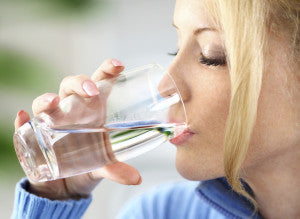Health in Hydration

Summer or winter, spring or fall, staying hydrated is essential to maintaining good health. After all, water makes up the
majority of our body weight. Countering dehydration is the best way to treat it, but before we get into that, let’s take a look at how dehydration can come about.
How Dehydration Occurs
Sweating, going to the bathroom, and even breathing are all contributing factors to
losing water. Basically, the more that leaves your body, the faster you’ll become dehydrated. For example, diarrhea and vomiting can bring about rapid water loss. Hot climates and being physically active will also speed up the dehydration process. When losing water, be sure to replace it with more.
Symptoms of Dehydration
[caption id="attachment_20911" align="alignright" width="300"]

Headaches are one sign of dehydration.[/caption]
Dehydration is more than just being really thirsty.
Learn these symptoms so you will always know what your body is telling you, and when it’s time to take immediate action.
- Dry mouth
- Little/no urine, or darker than normal
- Headache
- Confusion
- Dizziness
- Fatigue
Dangers of Dehydration
Staying hydrated has many benefits, which means the adverse is also true.
The National Institutes of Health has identified many ways in which dehydration hurts you.
- Physical performance
- Cognitive performance
- Delirium
- Gastrointestinal function
- Kidney function
- Heart function
For more information regarding the dangers of dehydration, you can read the full study here:
http://www.ncbi.nlm.nih.gov/pmc/articles/PMC2908954/
Some people are
more prone to becoming dehydrated than others. The elderly are especially at risk, since as people age, they may not be able to recognize or sense the signs of dehydration. Women who are pregnant or breastfeeding should also be careful to remain hydrated. Others who are at greater risk of dehydration are people who are exercising, have a fever, or are trying to lose weight.
Tips for Staying Hydrated

The amount of water needed for proper hydration varies from person to person, but
Ready.gov recommends about three quarters of a gallon of fluid daily for normally active people. Use that as a baseline and adjust depending on age, health, climate, and physical condition and activity.
Sometimes you may need to be more conscientious about your water intake. If you Replace you have difficulties staying hydrated, try out some of these tips from
the CDC and
FamilyDoctor.org.
- Don’t wait until you’re thirst – drink water constantly!
- Avoid alcohol or sugary liquids
- Keep a bottle of water with you throughout the day
- Add a slice of lemon to your water – this improves the flavor and can help you drink more
- Drink water when you’re hungry. Thirst can be confused with hunger, so try water first
It’s more obvious that you need to be more careful about staying hydrated during the hot summer months, but you can still become dehydrated during the colder times. No matter what time of year it is, pay attention to what your body is telling you and take the necessary steps to always remain hydrated.
What steps do you take to remain hydrated?
 Katadyn Hiker Microfilter Giveaway
Katadyn Hiker Microfilter Giveaway
 Summer or winter, spring or fall, staying hydrated is essential to maintaining good health. After all, water makes up the majority of our body weight. Countering dehydration is the best way to treat it, but before we get into that, let’s take a look at how dehydration can come about.
How Dehydration Occurs
Sweating, going to the bathroom, and even breathing are all contributing factors to losing water. Basically, the more that leaves your body, the faster you’ll become dehydrated. For example, diarrhea and vomiting can bring about rapid water loss. Hot climates and being physically active will also speed up the dehydration process. When losing water, be sure to replace it with more.
Symptoms of Dehydration
[caption id="attachment_20911" align="alignright" width="300"]
Summer or winter, spring or fall, staying hydrated is essential to maintaining good health. After all, water makes up the majority of our body weight. Countering dehydration is the best way to treat it, but before we get into that, let’s take a look at how dehydration can come about.
How Dehydration Occurs
Sweating, going to the bathroom, and even breathing are all contributing factors to losing water. Basically, the more that leaves your body, the faster you’ll become dehydrated. For example, diarrhea and vomiting can bring about rapid water loss. Hot climates and being physically active will also speed up the dehydration process. When losing water, be sure to replace it with more.
Symptoms of Dehydration
[caption id="attachment_20911" align="alignright" width="300"] Headaches are one sign of dehydration.[/caption]
Dehydration is more than just being really thirsty. Learn these symptoms so you will always know what your body is telling you, and when it’s time to take immediate action.
Headaches are one sign of dehydration.[/caption]
Dehydration is more than just being really thirsty. Learn these symptoms so you will always know what your body is telling you, and when it’s time to take immediate action.
 The amount of water needed for proper hydration varies from person to person, but Ready.gov recommends about three quarters of a gallon of fluid daily for normally active people. Use that as a baseline and adjust depending on age, health, climate, and physical condition and activity.
Sometimes you may need to be more conscientious about your water intake. If you Replace you have difficulties staying hydrated, try out some of these tips from the CDC and FamilyDoctor.org.
The amount of water needed for proper hydration varies from person to person, but Ready.gov recommends about three quarters of a gallon of fluid daily for normally active people. Use that as a baseline and adjust depending on age, health, climate, and physical condition and activity.
Sometimes you may need to be more conscientious about your water intake. If you Replace you have difficulties staying hydrated, try out some of these tips from the CDC and FamilyDoctor.org.
 Katadyn Hiker Microfilter Giveaway
Katadyn Hiker Microfilter Giveaway

